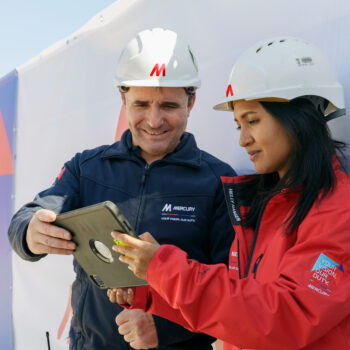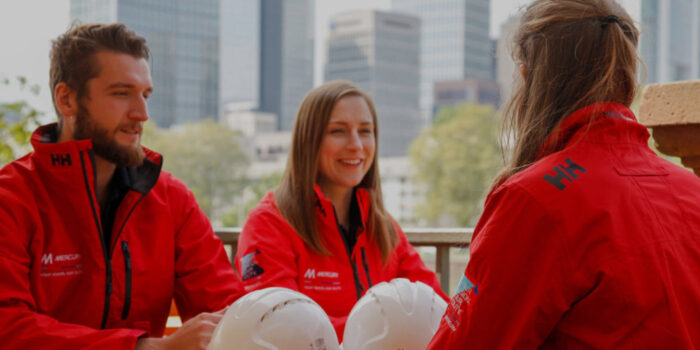News & Insights

International Asperger’s Day 2022: Hugh Headley on working with autism in construction
Diversity and Inclusion is woven into the fabric of the vision and values of Mercury, not only through our culture, but through the entire life cycle of the employee experience. Creating and maintaining a workplace culture that values and leverages our differences and similarities is one of our core strengths.
To mark International Asperger’s Day 2022, we spoke to Hugh Headley, an EHS Advisor based on the New Children’s Hospital (NCH) project in Dublin, Ireland.
Hugh, who joined Mercury in 2021, was diagnosed with Asperger’s – a form of autism – back in 2015, and spoke to us about how his disability has impacted his career to date, while also paying tribute to Mercury’s culture of understanding, diversity and inclusion.
When did you join Mercury and when were you diagnosed with autism?
“I was diagnosed with autism when I was 23, it came as a relief to me because it explained why I had difficulties with things which came naturally to others. Autism definitely shaped the direction of my career. Although I had a degree in engineering I struggled to function well in interviews and the jobs I worked in weren’t suitable for me. After 3 years in engineering and project management I joined the New Children’s Hospital project in May 2021, where I took up the role of junior safety officer. The team here and across Mercury are very supportive.”
How has autism affected your career to date?
“I have a list as long as my arm of the things which could and did go wrong in an interview. The variety of styles and personalities of interviewers made the task very difficult to prepare for. Sometimes I got paralysed and was unable to speak because of conflicting social situations. Asking for help hasn’t always worked for me. I have experienced interviewers ignoring the request for assistance, interview coaches advising that I don’t ask for assistance, and HR managers telling me that I should do the interview without assistance.”
“Autism covers a very broad set of traits that affect how people function and what might be easy for one person with autism could be a major challenge for another. Despite this there are stereotypes that those with autism can’t communicate well and don’t work well with others. Today’s job market puts a huge emphasis on teamwork and communication, and this creates a stigma which discouraged me from being open about being autistic. More often than not I chose to hide my disability during the interview with the aim of disclosing it after I got the job.”
What issues have you encountered since starting your new role?
“So far the work in Mercury has suited me very well. There are a few times when pressured social situations and confused discussions caused me to freeze up and become very passive in the conversation. In these situations, I show the other person a card from my wallet which lets them know I have autism and that I need a moment to stop and think.”
What tools and support functions have helped you succeed in your role?
“The most important thing is that people in work have been understanding and patient when something goes wrong. That way we can figure it out. Seeing this from senior management gives reassurance that it is part of the company culture.”
How important is raising awareness regarding conditions such as autism in order to support our people?
“Conditions such as autism aren’t as well understood as physical disabilities. People can generally recognise physical disabilities and know how to help out. The traits of some autistic people can come across as rude and it’s really important that this is met with understanding. A hostile response causes people to hide their difficulties and suffer in silence.”
What is an important message for those managing employees with similar conditions?
“The effects of autism vary a lot from person to person so it’s best to ask the individual what form of help they need. Socialising is something which we do constantly whether talking or not. With a lot of unwritten rules the social situation is complicated and different every time. When helping someone with autism, simple rules won’t always work and so there needs to be some understanding that there isn’t a quick and easy fix for autism.”
Tom Fields, EHS Sector Lead for our Healthcare Business Unit, works with Hugh on a daily basis and spoke about the positive role that Hugh plays in maintaining our dedication to safety on the NCH project.
He said: “To begin with I didn’t know Hugh had a condition and didn’t know much about autism until Hugh spoke to me about difficulties he was experiencing. We had a good chat about it, and I reassured Hugh that he has a place at Mercury. I reminded him that we have an excellent Employee Assistance Programme.”
“Anybody who works with me knows that I am very direct. I realised however, that to help Hugh’s development, I needed to pause and listen more before continuing. Now I have a greater understanding of how Hugh works, and Hugh has a greater understanding of me. Since joining the team he has taken on a large workload, such as report writing, auditing and ensuring safety compliance from subcontractors, and this really compliments the skill sets of the entire team.”
To read more about International Asperger’s Day, click here.
DIVERSITY & INCLUSION
Diversity & Inclusion forms part of Mercury’s Responsible Business programme, and is a key factor behind our winning culture
We have put in place a Diversity & Inclusion Policy that is driven by our Executive Management Team. Diversity & Inclusion is woven into the fabric of the vision and values of Mercury, not only through our culture, but through the entire life cycle of the employee experience.
Like Mercury on Facebook.
Follow us on LinkedIn, Twitter, and Instagram.


